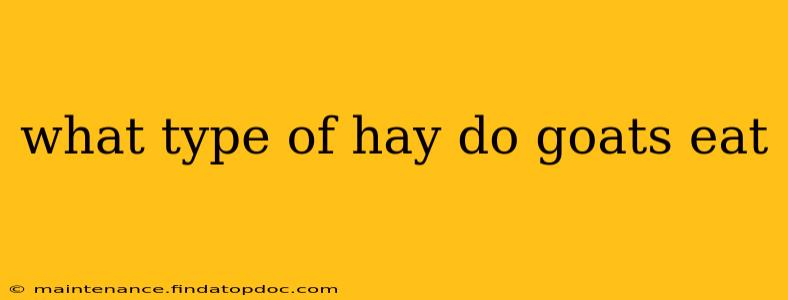What Type of Hay Do Goats Eat? A Comprehensive Guide for Goat Owners
Goats are browsers, not grazers, meaning they prefer a variety of forages over large quantities of a single grass. While they'll happily munch on grass, hay forms the cornerstone of a goat's diet, providing essential nutrients and fiber. But not all hay is created equal. Choosing the right type of hay is crucial for your goat's health and well-being. This guide will explore the best hay options for goats, addressing common questions and concerns.
What are the best types of hay for goats?
The ideal hay for goats is nutritious, palatable, and free from mold, weeds, and pesticides. Several types excel in these areas:
-
Alfalfa: A highly nutritious legume, alfalfa is rich in protein and calcium, making it excellent for growing goats, pregnant does, and lactating nannies. However, its high calcium content can be problematic for adult goats not in these stages, potentially leading to urinary calculi (stones). It's best offered in moderation to adult goats.
-
Grass Hays: These include orchard grass, timothy, brome, and ryegrass. Grass hays are lower in protein and calcium than alfalfa, making them a good choice for maintaining adult goats. They provide essential fiber for healthy digestion. Timothy hay is often considered a good all-around option, being relatively palatable and widely available. Orchard grass is another popular choice, known for its high palatability.
-
Clover: While not a hay in the strictest sense (it's a legume), red clover can be included in a goat's diet as part of a mixed hay or in moderation. It's a good source of protein but, similar to alfalfa, is high in calcium.
-
Mixed Hays: These blends often combine legumes like alfalfa with grasses, offering a balanced nutritional profile. They can be a good way to provide a variety of nutrients without relying solely on one type of hay.
What kind of hay should I avoid feeding my goats?
Some hays are less suitable for goats due to low nutritional value, potential toxicity, or the presence of harmful substances:
-
Moldy Hay: Moldy hay can contain mycotoxins, which are harmful to goats and can cause serious illness. Never feed your goats moldy hay.
-
Hay with excessive weeds: Certain weeds can be toxic to goats. It's crucial to ensure your hay is relatively weed-free.
-
Treated Hay: Hay treated with pesticides or herbicides should be avoided completely.
-
Hay containing Johnson Grass: This grass contains cyanide compounds that can poison goats. Avoid this entirely.
How much hay should I feed my goats?
The amount of hay a goat needs depends on several factors, including its age, size, breed, activity level, and whether it's pregnant or lactating. Generally, a mature goat should consume around 2-3% of its body weight in hay daily. For example, a 100-pound goat would need 2-3 pounds of hay per day. It's always best to consult with a veterinarian or experienced goat breeder to determine the appropriate amount for your specific goat.
Can goats eat other things besides hay?
While hay is the foundation of a goat's diet, they can also benefit from other foods in moderation:
-
Fresh browse: Branches and leaves from various trees and shrubs can provide valuable nutrients and enrichment.
-
Fruits and vegetables: Offered sparingly, as treats.
-
Commercial goat feed: This supplements hay but shouldn't replace it.
What are the signs of a goat not getting enough hay?
If your goat isn't getting enough hay, you might notice:
-
Weight loss: This is a significant indicator of insufficient nutrition.
-
Poor coat condition: Dull, brittle hair indicates nutritional deficiencies.
-
Decreased activity levels: Lethargy can be a sign of malnutrition.
-
Behavioral changes: Increased aggression or anxiety can be caused by stress related to hunger.
Remember, consulting with a veterinarian or experienced goat breeder is always recommended to ensure your goats receive the best possible nutrition. Providing the right type and amount of hay is a crucial step in keeping your goats healthy and happy.
